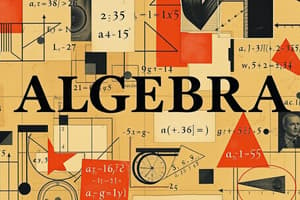Podcast
Questions and Answers
What is the highest power of the variable in a linear function?
What is the highest power of the variable in a linear function?
1
Give an example of a quadratic function.
Give an example of a quadratic function.
f(x) = x^2 + 4x + 4
What is the definition of a polynomial function?
What is the definition of a polynomial function?
A function consisting of variables and coefficients combined using only addition, subtraction, and multiplication.
What is the formula for function addition?
What is the formula for function addition?
What is the definition of an even function?
What is the definition of an even function?
What is the range of a function?
What is the range of a function?
Give an example of a rational function.
Give an example of a rational function.
What is the formula for function multiplication?
What is the formula for function multiplication?
What is the definition of an exponential function?
What is the definition of an exponential function?
What is the definition of a logarithmic function?
What is the definition of a logarithmic function?
Flashcards are hidden until you start studying
Study Notes
Types of Functions
- Linear Functions: A function in which the highest power of the variable (usually x) is 1. Examples: f(x) = 2x + 3, f(x) = x - 4.
- Quadratic Functions: A function in which the highest power of the variable (usually x) is 2. Examples: f(x) = x^2 + 4x + 4, f(x) = x^2 - 3x - 2.
- Polynomial Functions: A function consisting of variables and coefficients combined using only addition, subtraction, and multiplication. Examples: f(x) = x^4 + 2x^3 - 3x^2 + x - 1, f(x) = x^2 + 2x - 3.
- Rational Functions: A function that can be expressed as the ratio of two polynomial functions. Examples: f(x) = (x + 1) / (x - 1), f(x) = (x^2 + 2) / (x - 2).
- Exponential Functions: A function in which the variable is in the exponent. Examples: f(x) = 2^x, f(x) = 3^(2x).
- Logarithmic Functions: A function that is the inverse of an exponential function. Examples: f(x) = log2(x), f(x) = ln(x).
Function Operations
- Function Addition: (f + g)(x) = f(x) + g(x)
- Function Subtraction: (f - g)(x) = f(x) - g(x)
- Function Multiplication: (f × g)(x) = f(x) × g(x)
- Function Division: (f ÷ g)(x) = f(x) ÷ g(x), where g(x) ≠ 0
Function Properties
- Domain: The set of input values for which the function is defined.
- Range: The set of output values of the function.
- Even Function: A function that satisfies f(-x) = f(x) for all x in its domain.
- Odd Function: A function that satisfies f(-x) = -f(x) for all x in its domain.
Graphing Functions
- X-Intercept: The point at which the graph intersects the x-axis.
- Y-Intercept: The point at which the graph intersects the y-axis.
- Asymptotes: Lines that the graph approaches as the input values increase or decrease without bound.
- Maxima and Minima: The highest and lowest points of the graph, respectively.
Studying That Suits You
Use AI to generate personalized quizzes and flashcards to suit your learning preferences.




